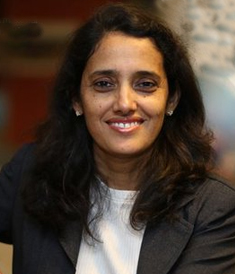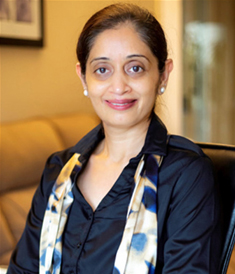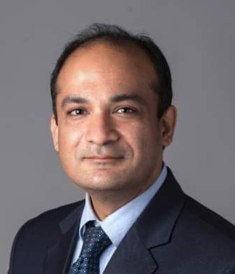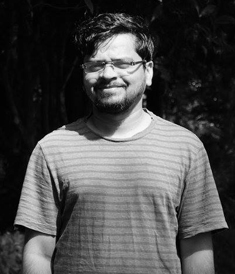Healthcare
Talk Title, Abstract & Bio of Speakers

Ms. Sunita Nadhamuni
Presentation Schedule: 9:35 AM - 10:10 AM
Talk Title: Digital Transformation of a Nation-scale Public Health Program
Abstract: To combat the rising burden of non-communicable diseases (NCDs) in India, the Ministry of Health and Family Welfare launched the Population Based Screening and Management of NCDs program under Ayushman Bharat Health and Wellness Centers in 2018. This program includes the risk assessment, screening of all individuals over the age of 30 followed by treatment and management as needed for five common NCDs – hypertension, diabetes and 3 common cancers.
Dell Technologies and Tata Trusts have partnered with the Ministry to develop and deploy the technology system, called CPHC-NCD system (Comprehensive Primary Health Care) for the national NCD program. The CPHC-NCD IT system is based on Digital LifeCare, an open source, scalable technology platform to enable improved delivery of public health services and is a social impact contribution from Dell Technologies.
The CPHC-NCD system is a suite of mobile and web apps on a cloud platform for healthworkers, doctors and health administrators to support the program achieve continuum of care for NCD patients and to promote evidence-based decision making. The healthworker apps are available in ten regional languages and are designed for functioning in remote, rural areas. The platform-first approach ensures the IT system can scale to support hundreds of millions of citizens in a secure manner.
Deployed in 33 states with over a 135 million people enrolled, this system is unique in its design to support service delivery from village to secondary level and help ensure that no individual gets left out in their NCD care journey.
Bio: Sunita Nadhamuni is the global head of Social Innovation at Dell Technologies. In this role, she oversees Dell's global social innovation strategy that focuses on driving technology-enabled social impact programs to advance health, education, and economic opportunities for the underserved. Sunita is the founding member of Digital LifeCare, a technology platform developed by Dell Technologies for the Government of India's national NCD (non-communicable diseases) program. In addition to her role as the global head of Social Innovation at Dell Technologies, she acts as the company's representative for the World Economic Forum's EDISON Alliance.
Sunita has a unique combination of more than a decade of IT experience from the Silicon Valley, USA and more than 15 years of leading social impact initiatives in India. Prior to this, she was CEO of Arghyam, a charitable foundation working on water security in India and now serves as Chairperson of its Board. She also sits on the Advisory Committee for the NITI Aayog's Atal Community Innovation Centers program.
Sunita has an MS from Rensselaer Polytechnic Institute in NY and a BE from Andhra University. She is based in Bangalore, India.

Prof. Rakhi Dandona
Presentation Schedule: 10:10 AM - 10:45 AM
Talk Title: How mortality shapes health care: innovations in data science and machine learning
Abstract: Monitoring medically certified causes of death is essential to shape national health policies, track progress to Sustainable Development Goals, and gauge responses to epidemic and pandemic disease. Currently, only one in five deaths in India has a medically certified cause of death assigned, which renders it inadequate to facilitate policy making for improving population health. This presentation will describe the use of machine learning and innovations in data science to improve the availability and quality of cause of death data to estimate robust mortality patterns to improve population health.
Bio: Prof. Dandona is Professor at the Public Health Foundation of India and Professor of Health Metrics Sciences at the Institute for Health Metrics and Evaluation, University of Washington, Seattle, USA. She has over two decades of experience in generating empirical evidence on disease burden and risk factor distribution at the population level through epidemiological studies and in health system studies in India. She serves as Chair of the GBD India Injury Expert Group for the India State-Level Disease Burden Initiative. Prof. Dandona has held a variety of grants for public health research including from the Wellcome Trust, UK, the National Institutes of Health, USA, and the Bill and Melinda Gates Foundation. She has over 270 peer-reviewed publications, including in leading global journals. Prof. Dandona is listed in the Stanford Mendeley Database of top global scientists from 2017 onwards, with h-index of 102. Her profile was published in the Lancet Psychiatry in 2021.
Prof. Dandona is a member of the MQ Mental Health Research and Lancet Psychiatry Standing Commission on the COVID-19 Pandemic and Mental Health, and is member of the steering group of the International COVID-19 Suicide Prevention Research Collaboration. She was a Funding Committee Member for the Global Health RIGHTS grants on unintentional injuries of the National Institute for Health, UK in 2021-22. She is a member of the Technical Advisory Group of the National Data Quality Forum, and of the World Health Organization Task Forces on improving cause of death and verbal autopsy methods, and the Expert Committee of the Health Ministry in India to improve vital registration. Prof. Dandona serves as Associate Editor of the journal Injury Prevention and is on the Editorial Boards of the Lancet Psychiatry and the Lancet Public Health.

Dr. Vibhu Agrawal
Presentation Schedule: 10:45 AM.- 11:20 AM
Talk Title: Leveraging historical clinical trials data for safer oncology therapeutics
Abstract: Prospective studies represent superior evidence in clinical development, generating a multitude of data points spanning key clinical domains such as medical history, concomitant medications, procedures, labs, vitals, disposition and demographics for each subject. Even so, medical data modeling efforts have remained focussed primarily on "real-world" accounts of clinical trajectories and little published literature is available describing the challenges and opportunities for methodological advancement in modeling historical clinical trial data. My talk will draw examples from recent work in modeling toxicity risk in novel immunomodulatory therapies for advanced cancers. Specifically, I will illustrate the pressing need for robust methods at all stages of the data value-creation pipeline to inform strategic decisions in the development of safer and affordable cancer therapies.
Bio: Dr. Vibhu Agarwal is an entrepreneur-scientist with a track record of innovation, product management and commercialization in the areas of natural language systems, photovoltaic solar power and artificial intelligence. With over two decades of experience in quantitative analysis, his work has focused on modeling biomedical data to recapitulate relationships between health outcomes and patient care data from EHRs, claims, clinical trials, wearable sensors and web search logs. He specialises in developing AI techniques for synthesizing bio medical evidence by querying historical clinical trials as well as patient care data.
A former national awardee, he successfully sold his first venture in computational linguistics to Nuance Communication, a global leader in speech and language technology. He holds a PhD in Biomedical Data Science from Stanford University, a MBA from Hitotsubashi University (Tokyo, Japan) and a B. Tech from the Indian Institute of Technology (Kanpur, India).
Vibhu currently serves as the Senior Director, Data Science at Medidata a life sciences technology company (A Dassault Systemes company, www.medidata.com)

Dr. Soma S. Dhavala
Presentation Schedule: 11:20 AM - 11:55 AM
Talk Title: MURAD: A Multi-Lingual Real-Time Automatic Disease Surveillance System
Abstract: In this talk, we describe a system to extract infectious diseases events from news articles published on the web in English and Hindi, in near real-time. We affirmatively answer three questions: 1) Can we treat the web as a database to monitor infectious disease outbreaks 2) Can we expand the scope to other infectious diseases and 3) Can we extend the system to include low-resources languages? The event extraction pipeline consists of a Relevance Classifier, a fine-tuned BERT \& XLM-R, on public health datasets, to filter out irrelevant articles from non-public health domains such as sports, entertainment, etc. It is followed by a cascade of domain-adapted Named Entity Recognizers (NERs) to tag a document with Disease, Location, Date and Numbers. We pose the problem of binding all the tags into a syntactically meaningful event as a textual entailment problem. Specifically, we model this as a MRC problem providing documents as context, thereby leveraging state-of-the-art QA models. We also develop evaluation metrics to benchmark different approaches on the event extraction task. We show that our proposed system is competitive, achieving both the precision and recall above 0.85 on a small, manually created test set. Our proposed web-scale system is extensible to other diseases, geographies, and languages, and can augment and amplify human capacity to monitor disease outbreaks, during these testing pandemic times.
Bio: Dr. Soma Dhavala: Principal Machine Learning Scientist, Wadhwani AI. Building an ecosystem to democratize AI, make it an inclusive, accessible, equitable, and normalizing technology. Works at the convergence of technology, science, and applications (for social good).
